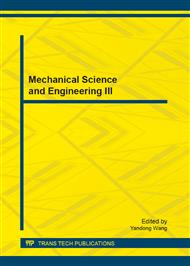p.244
p.248
p.254
p.261
p.266
p.271
p.276
p.283
p.287
A New Hybrid Particle Swarm Optimization for Solving the Knapsack Problem
Abstract:
A Knapsack Problem is a typical NP complete problem. For solving Knapsack problem, A new improved Particle Swarm Optimization algorithm was proposed in this paper, the new algorithm combine Dantzigs theory of Knapsack Problem and crossover and mutation operation of Genetic Algorithm. According their fitness values, individuals are improved firstly by crossover, Daviss sequence crossover method and reverse mutation method are used respectively in the course of crossover and mutation. Numerical examples illustrate the validity and efficiency of the new hybrid Particle Swarm Optimization.
Info:
Periodical:
Pages:
266-270
DOI:
Citation:
Online since:
June 2013
Authors:
Price:
Сopyright:
© 2013 Trans Tech Publications Ltd. All Rights Reserved
Share:
Citation:


